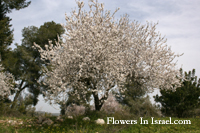
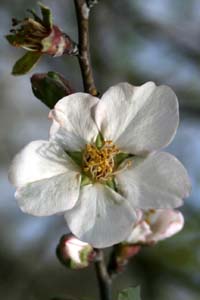
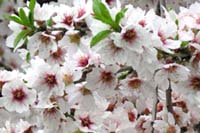
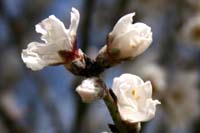
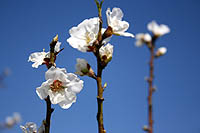
|
Tu Bishvat (ט"ו בשבט), "The New Year For the Trees"
Rosh HaShanah La'Ilanot (ראש השנה לאילנות)
Tu B'Shvat begins sundown Tuesday evening, February 03, 2015 and ends at nightfall on Wednesday, February 04, 2013 (15th of Sh'vat, 5773)
- Sun, 24 January 2016 (15th of Sh'vat, 5776)
Tu Bishvat is the Rosh HaShanah La'Ilanot (ראש השנה לאילנות) "new year of the trees", because by that date, "most of the rain has already fallen."
Winter has already passed its peak, and fresh new growth can begin.
Tu B'Shevat, the fifteenth of Shvat is mentioned for the first time in the Mishna (1st-2nd century) as one of the four New Years of the Jewish calendar (The Torah did not mention Tu B'Shevat).
There is a dispute as to the proper date for the holiday; Beit Shammai said the proper day was the first of Shevat; Beit Hillel said the proper day was the 15th of Shevat (tractate Rosh Hashana, folio 2b).
In 1908 the Jewish National Fund and Jewish education system, adopted the custom of school children and their teachers going out to the fields and mountains to plant saplings. The planting of trees was turned into a symbol of the participation of the individual in the national project of redemption.
Tu B'Shevat symbolizes the revival of nature and of the renewed ties between the Jewish people and its land.
Different institutions choose that day as their inauguration day:
The cornerstone of the Hebrew University in Jerusalem was laid in 1918;
The Technion in Haifa in 1925;
The Knesset - the Parliament of Israel in 1949.
It is a date used by farmers as a basis to calculate the annual yield of fruits, in order to know the amount of the tithe that the Bible requires.
Leviticus 27:30: 'Thus all the tithe of the land, of the seed of the land or of the fruit of the tree, is the LORD'S; it is holy to the LORD (a tithe -from Old English teogo?a "tenth").
It also determines the beginning and end of the first three and four years of the tree's growth, during which it is forbidden to eat fruit from the trees.
Jotham's Parable (Judges 9: 7-21, Hebrew: mashal, משל יותם), allegorical story against the monarchy, has become a children's tale and in recent years is told on Tu B'shvat.
Jotham, the youngest son of Gideon and the only one left living besides Abimelech, escapes to Mount Gerizim, near Shechem and tells what has come to be known as Jotham's Parable, the story of "the trees who went forth to anoint a king over them."
He is using the metaphor of the the jujube to ridicule his older brother, Abimelech, who has unjustly annointed himself king, surrounded himself with yes-men and murdered all his brothers except for Jotham.
The trees first appeal to the olive, 'Be our king.' the latter refuses to be a king, asking, 'Should I give up my oil, by which both gods and men are honored, to hold sway over the trees?'
The fig and the vine likewise turn down the crown.
Neither wants to cease producing the benefits with which it honors God and man: its sweetness and good fruit, or its wine; with perhaps surprising honesty, each plant claims that it cannot both nourish its people and enable them to honor God, and at the same time be a monarch.
"Finally all the trees said to the Jujube (Ziziphus spina-christi, Hebrew: Atad,אטד), 'Come and be our king.'
And the Jujube , with nothing to offer but its shadow, agrees to reign, but not without making a thinly-veiled threat: 'If you really want to anoint me king over you, come and take refuge in my shade; but if not, then let fire come out of the Jujube (Atad) and consume the cedars of Lebanon!' (Judg. 9:15).
The Jujube has no appealing shade, but is aggressive thorny and its wide spreading root-system is well-known for leaching all nourishments from the soil.
The olive, fig, vine and jujube in the parable stand for different kinds of people. The good fruits are symbols of good works.
The jujube is the type of someone who does not do good uses or only does them for show and for selfish gain. The olive, fig and vine are modest and wish only to serve, but selfishness loves to rule and to be served. Fire coming out of the jujube means the burning of selfish desires. The cedar which the fire destroys stands for rational understanding. Someone who is proud or angry cannot be wise.
|
|
|
|




